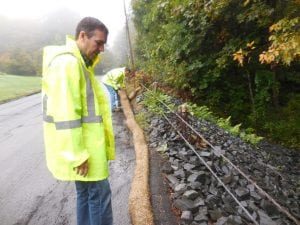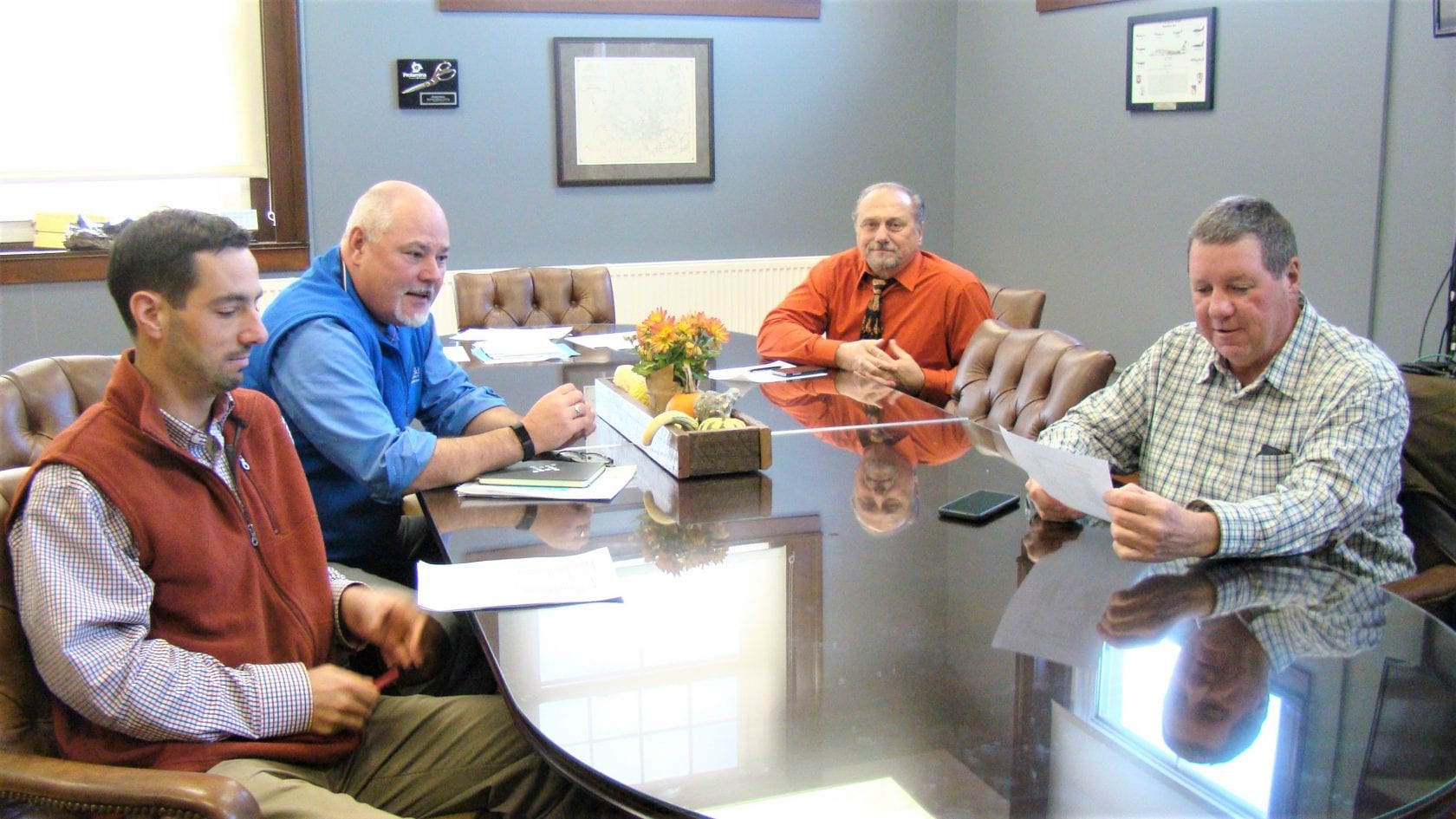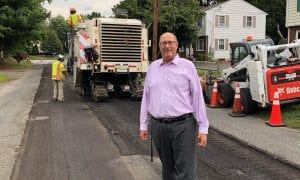
Assistant Civil Engineer Jeremy Cigal, Mayor Brian P. Sullivan, Civil Engineer Mark Cressotti and DPW Director David Billips look back at the 2018 road improvements. (Photo by Amy Porter)
WESTFIELD – Looking back, now that construction is mostly shut down for the season, 2018 turned out to be a banner year for road improvements in Westfield. “We did $5 million worth of road improvements this year,” said City Engineer Mark Cressotti at a meeting with Mayor Brian P. Sullivan, Department of Public Works Director David Billips and Assistant Civil Engineer Jeremy J. Cigal.
“We have done a boat load of roads,” said Mayor Sullivan, adding that it’s difficult to group them together because of the different sources of funding used. Some of the roads were done as a part of the Joseph Avenue and Ridgecrest Sanitary Sewer Improvement projects. Other roads were done with the $1.2 million in Chapter 90 funds the city receives annually, or with a combination of Chapter 90, DPW budgeted funds and Meals Tax income.
The recent statewide increase in Chapter 90 funds from $200 million to $240 million, which will bring an additional $250,000 for Westfield came in too late for this construction year, Cressotti said, and will be used in the spring.
Cigal did take a look at the 2018 Paving Program, and made a quick list of the roads and work done according to the different sources of funding. The total spent by the city was approximately $4,934,000, he said.
$1.55 million was spent on Joseph Avenue pavement restoration from sewer funds – including Joseph Ave., Amy Dr. and Christopher Dr.
Grandview Drive and Papermill Road were paid for with sewer funds and Chapter 90.
Another $900,000 in sewer funds was spent on the Ridgecrest Sanitary Sewer Improvement for Fawn Lane, Bigwood Drive, Blueberry Ridge, Gary Drive and Kelly Drive.
Cold in place recycling on North Road, a new technology for the city, cost $730,000 in DPW and Chapter 90 funds. The city also did cold in place recycling on Shaker Road for $365,000, solely with DPW funds.
Paving projects included $75,000 for Avery St. paid for by CDBG and Chapter 90 money.

DPW Deputy Superintendent Casey Berube looks over new swale on Granville Road in October.
Other Chapter 90 paving projects included $85,000 for St. Dennis; $145,000 for Montgomery Road; $95,000 for Old Stage Road; $76,000 for Dry Bridge Rd.; $305,000 for Lockhouse Rd.; $112,000 for Silver St. and $440,000 for Granville Rd.
DPW funds alone of $24,000 were used for paving Middle Road, and $32,000 for the last paving project on Eastwood Drive.
The Mayor noted that the roads that were done were all over the city, some on the outskirts of town. Billips said they included some very bad roads, such as North Road, Granville, Dry Bridge and Shaker.
Billips said one difference this year was the $400,000 budgeted in the DPW Construction line item. Two years ago, that line item was $150,000, and last year, $300,000. “We spent it all,” Billips said, adding that they also did a lot of stormwater work on Granville, North Road and Shaker Road.
The $400,000 in the budget did not cover the construction costs for the department. Billips said the DPW spent $365,000 alone for the cold in place recycling work on Shaker Road, and the same amount plus Chapter 90 funds to do that work on North Road.
“We budgeted $400,000, but did $1 million worth of road work,” Sullivan said, and added in Meals tax money, which came in above what was estimated. He and the department heads said other work not included in that $1 million is all of the pot hole and infrared work, plus $200,000 work of drainage work on Granville road, crack sealing, and tree work.
“Even line striping follow up is sometimes $50,000 to $75,000,” Cigal said.
“Collectively, we spent $5 million. That’s a number we could do annually – $5 million a year every year to repair and upkeep our streets,” Mayor Sullivan said, adding that this year $2 million of the work came from sewer funds.
“Usually we use $1.2 million in Chapter 90, and spend a total of $1.7 to $1.8 million on the roads,” Billips said. As far as next year, “a lot of this will be in the City Council’s hands on what they take for votes on the budget and the stormwater fee increase,” he added.
Sullivan said he hopes to budget as much in construction next year. He also said the Meals tax total for Fiscal 18 was $519,506 and was used primarily for road repairs. “The Meals Tax is healthy right now because the economy as a whole is doing well,” Mayor Sullivan said, adding, “I plan to continue using funds from this financial source to upgrade and repair our infrastructure.”
Mayor Sullivan said they are now waiting for the finishing touches on a “Pavement Management Plan” report, which is being done by the BETA Group, Inc., a Massachusetts engineering firm that answered a bid from the city. The report will include a capital spending plan for the roads in the city.
Cigal, who is working closely with the BETA Group, said the report is due within the month. He said the report is based on what work needs to be done to stay level with current pavement conditions, and where to spend another $1 million. He said it will be a pretty comprehensive report on existing conditions, and will have scenarios for each street for the most cost effective repair.
“It’s the basis for long-term plan,” Cigal said.
This is the first comprehensive report on the roads that has been done in the past 20 years. After the last one, according to Billips, the city stayed on course for a few years, and then priorities changed.
Over the winter, they will put together a plan based on the report.
“There’s more to doing our roads than the nice new pavement,” Mayor Sullivan said, referring to engineering, stormwater work and environmental conditions. “We want to get back on track and have a managed approach to streets instead of reactionary,” he added.







